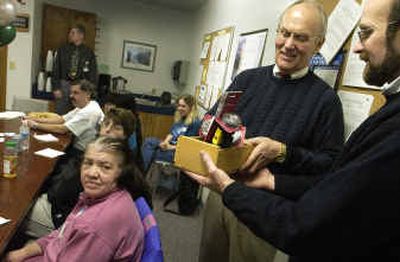TESH calls in some star power

Sen. Larry Craig is a champion as far as TESH is concerned. Larry is not known as a tireless crusader for better living for TESH’s developmentally disabled clients or one who constantly shines a spotlight on the good work TESH does to improve living and jobs skills for its clients. But TESH has never questioned the senator’s support of its mission and hopes it never has to.
Which is why the nonprofit organization is dubbing Larry a JWOD Champion. Larry now has to prove that’s he’s worthy of the honor.
“We want the legislators to understand how valuable this work is, to put a face on it for them,” Ken Korczyk, TESH’s director, said this week as he prepared for a visit from the senator.
JWOD – pronounced Jay-wod – is short for Javits-Wagner-O’Day Act. It’s a federal program started in 1938 to ensure work for the blind. That’s when the federal government began buying brooms, mops and other items blind people made. In 1971, the act was expanded to ensure work for people with disabilities. The federal government sets aside certain contracts, largely janitorial, for the developmentally disabled population.
The government sets the wages, includes benefits and health insurance or money for insurance if none is wanted.
Ken heard about the availability of special contracts soon after TESH hired him in 1979 to find work for the organization’s clients. He pushed himself through the ponderous application procedure and had five clients – the only local federal programs – by 1984. Those contacts have kept about 20 people with developmental disabilities employed for 20 years. One person has held onto his job for nearly 12 years.
Last year, JWOD contracts earned $95,000 for people with disabilities in North Idaho. Workers earned an average of $10.73 an hour cleaning the federal building in Coeur d’Alene, Coeur d’Alene River Ranger Station in Silverton, the U.S. Forest Service Regional Office, Forest Service nursery and Fernan Ranger Station.
“We have to be vigilant to small business threats to the program,” Ken said. “There are people out there who are mad we have those contracts.”
Advocates for the developmentally disabled population began the JWOD Champ title a few years ago to reinforce the program’s importance.
“We want to raise awareness that people with disabilities want good jobs and wages,” Ken says. “So we named Sen. Craig a JWOD champ and invited him to tour a job site.”
Larry has to earn the title. He visited TESH clients at work Thursday. He also needs to announce in a press release his support for work contracts for people with disabilities and he needs to use a product made by people with disabilities. While Larry was at TESH, Ken presented him with a flashlight made at Development Workshop Inc. in Idaho Falls, where developmentally disabled people work.
“I’ve toured this shop,” Larry said, smiling as he studied his gift.
About 12 TESH workers met the senator but had little to say. They smiled and told him they’d worked four or five years or hoped to retire someday or hoped to work as many as 30 years. Ken told Larry that some workers had graduated from working in the federal contracts program to competitive jobs in the community.
“These people are all paying taxes,” he reminded the senator.
John Martin, the senator’s regional director, said private business hasn’t bothered Larry about JWOD so the contracts aren’t an issue for him. Heidi Ericksen wants to make sure that status doesn’t change. Larry met her Thursday as her janitorial shift at the federal building in Coeur d’Alene ended.
Heidi, 33, is a TESH client and has worked at the federal building for three years.
“Oh, I love the salary. It’s great pay,” she said, with a gleeful smile. “It’s really a neat experience. The people at the federal building are very nice. They like to joke.”
Heidi flew to Washington, D.C., last year with Pam Harris, TESH’s director of rehabilitation, and shared her enthusiasm for her work with Larry’s staff. She lives with her parents and saves her earnings for vacations. Half the TESH workers live on their own and support themselves with their earnings. They work anywhere from four hours to 28 hours a week.
Larry indicated that TESH doesn’t need to worry about his support for JWOD.
“It’s a very valuable program,” the senator said. Workers nodded in solemn agreement. “When I visit people so involved and successful, it reminds me how important it really is.”